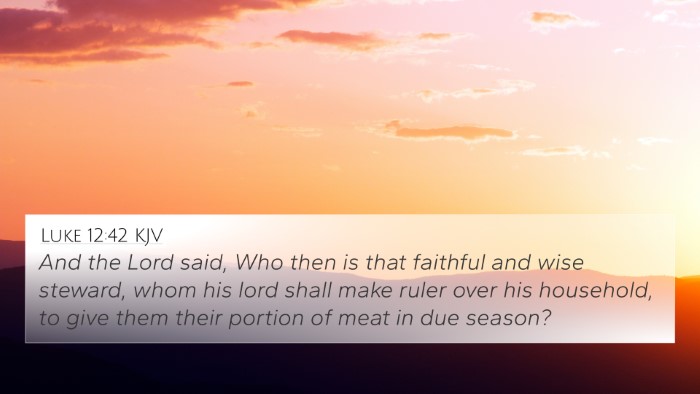Understanding 1 Corinthians 4:2
The verse 1 Corinthians 4:2 states, "Moreover it is required in stewards, that a man be found faithful." This verse emphasizes the importance of faithfulness and accountability in stewardship, particularly in the context of the Christian faith, where believers are called to responsibly manage the gifts and duties entrusted to them by God.
Key Themes
- Stewardship: The concept of being a steward is central to this verse. In biblical terms, stewardship refers to the responsibility given to believers to manage God's resources, whether they be spiritual gifts, material resources, or relationships.
- Faithfulness: This verse highlights that faithfulness is a critical quality for stewards. It implies that being trustworthy and dependable is paramount in the eyes of God.
- Accountability: The verse suggests that stewards will be evaluated based on their faithfulness. This introduces the element of accountability before God, stressing that our actions and decisions have eternal significance.
Commentary Insights
According to Matthew Henry, a respected Bible commentator, this verse serves as a reminder that the Christian life entails a solemn duty. Believers are not merely passive recipients of grace; rather, they are active participants in managing what has been entrusted to them. Henry emphasizes that this stewardship is not just in the context of leaders, but applies to all believers who have received gifts from the Lord.
Albert Barnes expands on this idea by noting that the primary duty of every steward is to exhibit faithfulness. He points out that faithfulness in little things is indicative of one’s capacity to handle larger responsibilities. This interpretation invites readers to self-reflect and evaluate their own faithfulness in the daily aspects of their lives.
Adam Clarke further explains the implications of this verse by discussing the cultural context of stewardship during the time of Paul. He notes that in the Greco-Roman world, stewards were entrusted with the management of their master's estate and were thus expected to act in the best interests of their master. The spiritual application of this principle means that Christians must act diligently and responsibly with what God has provided.
Bible Verse Cross-References
1 Corinthians 4:2 connects thematically with several other scripture passages that enrich its understanding:
- Luke 16:10: "He who is faithful in a very little thing is faithful also in much..." - This verse reinforces the idea of faithfulness in stewardship.
- Matthew 25:21: "Well done, good and faithful servant..." - Here, faithfulness is rewarded, providing a motive for believers to be diligent in their responsibilities.
- 1 Peter 4:10: "As each has received a gift, use it to serve one another..." - This emphasizes the duty of stewardship concerning spiritual gifts.
- Romans 14:12: "So then each of us will give an account of himself to God." - This verse highlights the accountability aspect of stewardship.
- 2 Timothy 2:2: "And what you have heard from me in the presence of many witnesses entrust to faithful men..." - Paul encourages discipleship and trusting the truth to faithful stewards.
- Proverbs 27:23: "Know well the condition of your flocks..." - A reminder of the practical aspects of stewardship in life.
- Colossians 3:23-24: "Whatever you do, work heartily, as for the Lord and not for men..." - This reinforces the quality of faithfulness in all endeavors.
Applying the Verse
For the modern believer, 1 Corinthians 4:2 serves as a call to action. How can one embody the principles of stewardship and faithfulness in today’s context? This can be reflected in various areas:
- Personal Development: Cultivating gifts and talents diligently as stewards of God's creation.
- Community Service: Actively engaging in the local community to serve others, thus fulfilling the stewardship of communal resources.
- Spiritual Growth: Regularly seeking to grow in Christ, as an investment in personal stewardship of one’s faith.
Conclusion
The essence of 1 Corinthians 4:2 is rooted in accountability, faithfulness, and the serious commitment of Christians to live out their faith through stewardship. By regularly cross-referencing and understanding this verse in relation to other scriptural texts, believers can gain a more profound comprehension of their responsibilities before God and among their fellow Christians.















